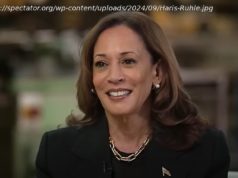As has often happened, he seized on an idea that someone else presented to him.
Ryan Lizza, writing for the New Yorker in 2011, inadvertently wrote a description of President Barack Obama’s foreign policy approach that has become part of the former president’s legacy. At the end of a long article about the Arab Spring, Lizza wrote, “One of his advisers described the President’s actions in Libya as ‘leading from behind.’ That’s not a slogan designed for signs at the 2012 Democratic Convention, but it does accurately describe the balance that Obama now seems to be finding.” “Leading from behind” stuck, despite Obama’s efforts to disavow it .
In that case, Obama ended up saddled with a phrase offered by a staffer that a reporter then brought to national attention. With President Trump, something else keeps happening: He’ll take an idea presented to him as a question from a reporter and immediately assume ownership of it.
Consider Trump’s “red line” on special counsel Robert S. Mueller III. It’s often said that Trump has established that his personal finances and business deals should be off limits to Mueller’s investigators and that any effort to delve into that world would cross a red line necessitating a response from the president. But Trump offered that definition only when specifically asked by reporters from the New York Times if such investigations would be going too far — questioning that included the use of “red line.”
The interview was conducted in July, with the Times’s Peter Baker, Maggie Haberman and Michael Schmidt questioning Trump at the White House. Earlier in the conversation, they’d been discussing the administration’s response to Russia, which prompted Trump to criticize Obama’s approach to Syria. (“The red line in the sand in Syria,” Trump said. “He didn’t do the shot. I did the shot.”)
The last question in the interview was from Schmidt.
The Mueller “red line” was born.
This isn’t an indictment of the Times. Trump has picked up ideas from other interviews as well that have started other tempests.
In November 2015, Trump was asked by a reporter from NBC News if he would build a database of Muslims in the United States. He replied, “Oh, I would certainly implement that — absolutely.”
That statement began several days of hedging and disavowals.
A little more than two weeks later, Trump announced support for a ban on Muslims entering the United States.
In January 2016, The Washington Post’s Robert Costa and Philip Rucker were talking to Trump about his chief rival for the Republican presidential nomination, Sen. Ted Cruz (Tex.). Cruz was born in Canada, which Trump seized on as presenting a potential problem, given the constitutional mandate that presidents be “natural-born citizens” of the United States.
From our article, with emphasis added:
Costa later explained that he raised the question because of Trump’s history of mentioning Cruz’s birthplace. In this case, Trump leaned into the idea. For the next two months, he sporadically hinted that Cruz was ineligible for the position.
In April, Trump was appearing on MSNBC when Chris Matthews asked him if women who had abortions should face criminal punishment.
“The answer is… that … there has to be some form of punishment,” he said, pausing to consider the question for a moment. You can see the pause in this excerpt from video of the moment.
That became Trump’s position — until a short while later when the campaign, recognizing the implications of his comments, walked it back.
There’s an obvious reason this has happened regularly. Trump prides himself on both his flexibility and decisiveness. Early in the campaign he argued that carefully articulated policy papers were a disadvantage because it tied his hands in negotiations. But the flip side to that is that on many politically important issues, like abortion, Trump hadn’t considered nuanced questions that were likely to be raised before they were presented.
It’s fascinating to consider what the current conversation about the special counsel would look like had Trump never seized on the idea of the red line drawn around his finances. He probably would be no less frustrated by what he sees, but he would lack the cover of having said early in Mueller’s tenure that his personal finances were off limits. It’s possible that Trump saw those subjects as off-limits before the Times even asked — but it’s also possible that he’d never really considered it as a distinct question.
Obama was frustrated by the “leading from behind” line in part because it wasn’t his own. Trump has argued that not having defined positions of his own is advantageous — although picking up suggestions from the media hasn’t always worked out for him.






